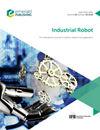基于力特性曲线综合法的伯努利夹持器力学性能优化
IF 2.5
4区 计算机科学
Q3 ENGINEERING, INDUSTRIAL
Industrial Robot-The International Journal of Robotics Research and Application
Pub Date : 2022-07-05
DOI:10.1108/ir-01-2022-0010
引用次数: 1
摘要
目的固定安装在机械手上的伯努利夹持器存在工作区域小、抗干扰能力差等局限性。本文旨在提出一种基于力特性曲线综合方法的新型伯努利夹持器设计,该设计涉及弹簧等正刚度部件的串联连接,以优化其力学性能。设计/方法/方法设计和制造了所提出的夹持器。在吸力过程中,对该夹持器的力特性曲线进行了理论和实验研究。在悬停检测过程中,建立了机械手-夹持器-工件系统的动力学模型,并建立了工件与机械手位移比较装置。所设计的夹持器最终在提升过程中得到应用,具有良好的抗冲击性能。结果实现了夹持器力学性能的优化。所提出的夹持器具有增大力特性曲线负刚度部分刚度、减小正刚度部分刚度、增大工作面积的作用。提高了工件在高频振动下的稳定性和抗干扰能力。同时,在提升过程中,与原结构相比,抗冲击性得到了提高。独创性/价值本研究提出了一种新颖的伯努利夹持器设计,以优化其机械性能。该夹持器具有工作区域大、抗干扰能力强、抗冲击能力强等优点。这些研究结果为伯努利夹持器的设计提供了重要的理论和实验参考。本文章由计算机程序翻译,如有差异,请以英文原文为准。
Optimization of mechanical performance of a Bernoulli gripper based on the force characteristic curve synthesis method
Purpose
The Bernoulli gripper fixedly installed on the manipulator is subject to limitations such as a small-working region and poor anti-interference capacity. This paper aims to propose a novel Bernoulli gripper design that involves the connection of a positive stiffness component such as a spring in series, based on the force characteristic curve synthesis method, to optimize the mechanical performance.
Design/methodology/approach
The proposed gripper is designed and manufactured. In the suction procedure, the force characteristic curve of the proposed gripper is theoretically and experimentally investigated. In the hovering detection procedure, a dynamic model of the manipulator-gripper-workpiece system is established, and an apparatus is set up to compare the displacements of the workpiece and the manipulator. The proposed gripper is finally applied in the lifting procedure, showing good impact resistance.
Findings
The optimization of mechanical performance of the proposed gripper is realized. The proposed gripper has the effect of increasing the stiffness of the negative stiffness part of the force characteristic curve and reducing the stiffness of the positive stiffness part, increasing the working region. The stability and the anti-interference ability of the workpiece under high-frequency vibration are improved. Meanwhile, the impact resistance in the lifting procedure is enhanced, compared with the original one.
Originality/value
This research proposes a novel design for the Bernoulli grippers to optimize the mechanical performance. The proposed gripper has advantages of a larger working region, better anti-interference ability and better impact resistance. These findings serve as important theoretical and experimental references for the design of the Bernoulli gripper.
求助全文
通过发布文献求助,成功后即可免费获取论文全文。
去求助
来源期刊
CiteScore
4.50
自引率
16.70%
发文量
86
审稿时长
5.7 months
期刊介绍:
Industrial Robot publishes peer reviewed research articles, technology reviews and specially commissioned case studies. Each issue includes high quality content covering all aspects of robotic technology, and reflecting the most interesting and strategically important research and development activities from around the world.
The journal’s policy of not publishing work that has only been tested in simulation means that only the very best and most practical research articles are included. This ensures that the material that is published has real relevance and value for commercial manufacturing and research organizations. Industrial Robot''s coverage includes, but is not restricted to:
Automatic assembly
Flexible manufacturing
Programming optimisation
Simulation and offline programming
Service robots
Autonomous robots
Swarm intelligence
Humanoid robots
Prosthetics and exoskeletons
Machine intelligence
Military robots
Underwater and aerial robots
Cooperative robots
Flexible grippers and tactile sensing
Robot vision
Teleoperation
Mobile robots
Search and rescue robots
Robot welding
Collision avoidance
Robotic machining
Surgical robots
Call for Papers 2020
AI for Autonomous Unmanned Systems
Agricultural Robot
Brain-Computer Interfaces for Human-Robot Interaction
Cooperative Robots
Robots for Environmental Monitoring
Rehabilitation Robots
Wearable Robotics/Exoskeletons.

 求助内容:
求助内容: 应助结果提醒方式:
应助结果提醒方式:


